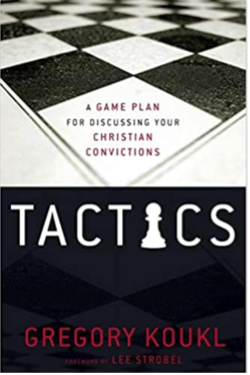
Methodology of Apologetics
Understanding the Argument
When you hear anything relating to God, Jesus, the occult, evolution, abortion, racism, or any other controversial topic, seize the opportunity and ask questions about what you heard. Do so in an inquisitive and positive way, to show a desire to better understand the others position.
- Focus on things the other cares about. Your goal in this stage is to learn about what the other person believes. Ask questions to gather details on what they think about the specific topic.
- Asking questions also keeps you in control of the conversation.
- Start with more superficial questions to ease into the conversation.
Methodology of Apologetics
- There are 3 reasons to ask these kinds of questions
- You want to avoid misunderstanding the other person’s position
- You don’t want to misrepresent their position
- You don’t want that person to misunderstand themselves
- The purpose for asking these kinds of questions is to better understand WHAT the other person believes.
- Ask questions like,
- “What do you mean by …?”
- “How do you fell about …?”
- “I’m not clear on that issue, can you expand on it for me?”
- “Can you explain your view?”
Finding Out Why
An argument in legal terms, is when you present your case and make a defense against an opposing party. It is not a “fight”. It is a discussion in which two parties present differing opinions and discuss them for the purpose at reaching a consensus. That isn’t always possible for reasons discussed later. However, it is a good idea to start out such a discussion by gaining insight into the other parties position. That’s when we ask our “why” questions.
- With each response received from the “what” questions addressed above, dig deeper with further questions about their responses.
- Often, the other person will make claims regarding God, religion, or something similar that will sound like stereotypical arguments with little basis in fact. The idea here is to ask questions that put the burden of proof back on the other party to support their claim.
- The purpose for digging deeper is to better understand WHY the other person thinks and feels the way he/she does.
- It is important to understand why they believe it as much as it is what they believe.
- Asking questions to dig deeper, such as,
- “That’s an interesting point. Can you tell me more about …?”
- “How did you come to that conclusion?”
- “Where did you get your facts regarding …?”
- “Why do you say that …?”
- “What are your reasons for holding the view that …?”
- “What makes that ides appeal to you?”
- “Can you give me some reasons for your conclusion?”
- “Why should I take your point seriously?”
- Some people may struggle to explain why they believe what they do. When this happens, ask them,
- If what they believe is even possible,
- Plausible,
- Or probable
- Avoid falling into the trap of a direct challenge by trying to defend the faith in a head-to-head duel. It is important to first make the other person defend their position instead of trying to defend ours, before all the facts are gathered. Ask the other person to explain the rational for their position, or for evidence to support their claims.
- Opposing parties will often make claims on behalf of yourself and other Christians and then claim they are wrong and insist you argue to prove them wrong instead. Don’t fall for this trap. Point out they made the claim, so they must defend the reasons for their claim.
- When facing a hostile and aggressive person that brings up an issue that you don’t know that much about, go back to fact finding mode and ask questions to gather more information. This will deflect the attack and make the person explain their position in more detail.
- People will often try to dodge questions asking them to provide evidence for their statements.Don’t let them change the subject. Call them out for avoiding answering your earlier inquiry as to provide evidence for their claim.
Recommended Reading
There are a number of books available to help you with your understanding of apologetics. LearningGod.org recommends you start with a book on the approach to apologetics first. The material in the section on methodology is primarily derived from Gregory Koukl’s book called “Tactics”.
In Tactics, Gregory Koukl demonstrates how to artfully regain control of conversations, keeping them moving forward in constructive ways through thoughtful diplomacy. You’ll learn how to maneuver comfortably and graciously through the minefields of a challenging discussion, how to stop challengers in their tracks, and how to turn the tables on question or provocative statement. Most importantly, you’ll learn how to get people thinking about Jesus.
Drawing on extensive experience defending Christianity in the public square, Koukl shows you how to:
- Initiate conversations effortlessly
- Present the truth clearly, cleverly, and persuasively
- Graciously and effectively expose faulty thinking
- Skillfully manage the details of dialogue
- Maintain an engaging, disarming style even under attack
Tactics provides the game plan for communicating the compelling truth about Christianity with confidence and grace.

